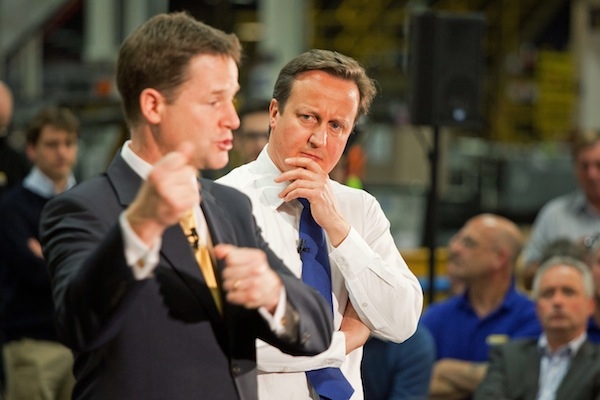Michael Gove’s plan to scrap GCSEs and replace them with a beefed-up O-Level are, as Brother Blackburn observed earlier, threatened by the Conservatives’ coalition partners. It seems quite probable that Gove’s proposals will be watered down following the usual “consultation” with the Liberal Democrats.
This will, understandably, vex Tories. Gove’s proposals have considerable merit even if, as always, the advantages of his plans are (partially) offset by their drawbacks. As successive governments have discovered it is difficult to build an education system that is demanding, universal and equitable. There must be winners and losers and the argument is chiefly about defining those terms.
Today’s developments also demonstrate that neither partner in this coalition has a proper understanding of coalition government. If David Cameron’s ministry frequently seems at odds with itself that is because we no longer enjoy a united government. The coalition has ceased to function. It is no team of rivals, rather teams of rivals. No wonder it ceases to function effectively.
If the economy was in finer fettle this might not matter so much but in the absence of cheerful economic news the Tories and Lib Dems have resorted to scoring points off one another. Each must carry some measure of the blame for this unsatisfactory state of affairs. Most of all, however, it reflects twin failures of leadership.
David Cameron and Nick Clegg each appear more frightened of their backbenchers and their members than is useful or appropriate. Policy announcements have become the starting point for intra-coalition negotiations as each side strives to prove to its own supporters that they are “winning” the internal coalition battle. For the Tories that means marginalising the Liberal Democrats; for Clegg’s platoon it means stymieing Tory proposals or, where that is not possible, at least blunting them. No wonder everyone is unhappy.
It should be the other way round. Policy should be announced after agreement not before it. If this means more compromise than either party might prefer then so be it. It would be more dignified than the present public horse-trading. It might also help foster the impression of a government that knows where it wants to go and how to get there.
These twin failures of party management ensure that the government has no clear direction. No wonder there’s a lack of grip; no wonder there are so many shambolic retreats. It is as though the government is receiving its orders from the grand old Duke of York.
A common purpose — and a common line — are always useful things but they’re more, not less, important in a coalition. Neither party seems aware of the fact that if they don’t hang together they’ll surely hang separately.
At present, however, the coalition is failing. Attempts to bounce or corner your so-called partners can only further erode whatever little trust remains. Equally, all this negotiating in public and scoring each announcement on a measure of its Blueness or Yellowness guarantees rancour, much wasted effort and a slovenly policy process.
Is it any wonder then that, with the possible exception of the Treasury (which has no shortage of problems itself) this government appears to have ceased to function properly? The blame for that lies with Cameron and Clegg’s failure to discipline their own parties and institute a proper and rigorous approach to both policy and communications.
Today’s stramash, then, is another reminder that this affair has turned sour. I dare say the coalition will limp on but when it ends few will look back on it fondly.
 Alex Massie
Alex Massie
The game is up






Comments